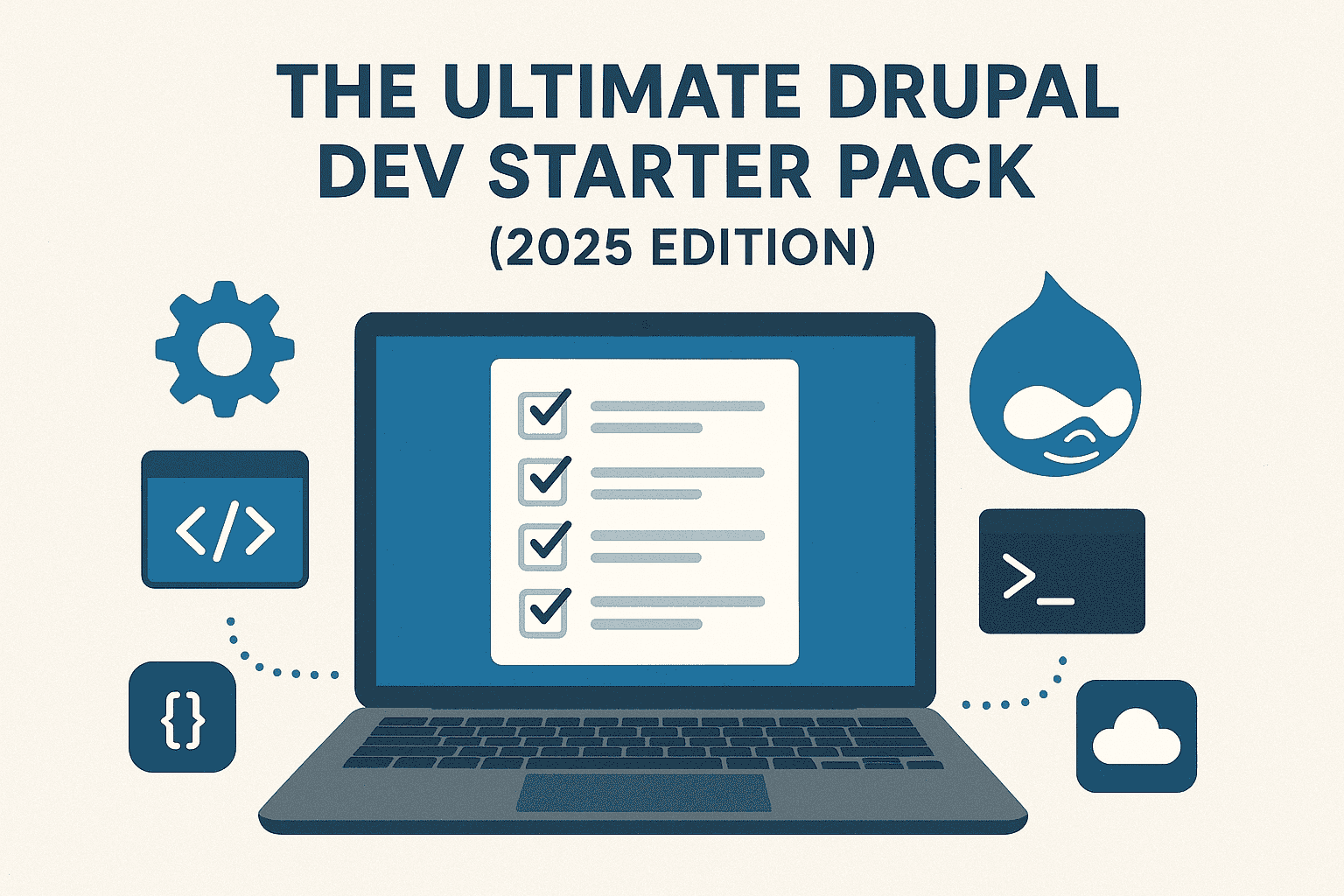If you’re building websites on Drupal in 2025, you already know it’s not your dad’s CMS anymore. The game has evolved—AI-assisted workflows, headless front-ends, decoupled architectures, automated deployments—the whole vibe is different now. But to roll with it, you need the right tools. Whether you’re freelancing solo or shipping enterprise-grade Drupal projects, your toolkit decides how smooth or chaotic your dev life will be.
Here’s the essential dev toolkit checklist for Drupal developers in 2025—free tools, premium upgrades, and why they matter.
1. The Local Dev Foundation: Setting Up Your Playground
🧰 Free: DDEV
If you’re not running DDEV yet, you’re missing out. It’s like Docker, but built specifically for web dev workflows. It lets you spin up a Drupal-ready local environment in seconds, with PHP, Nginx, MariaDB, and Composer all configured. You can switch PHP versions, share environments, and sync databases easily.
Why it’s essential: DDEV removes the “it works on my machine” problem. You get a standardized, portable setup that mirrors production.
💎 Premium Alt: Lando Pro
While Lando’s core is free, the Pro version adds enterprise-level features like prebuilt cloud integrations and automated image updates. It’s more plug-and-play and ideal if you’re managing multiple projects across teams.
Why upgrade: More stability, faster builds, and CI/CD integration straight out of the box.
2. Composer + Drush: The Dynamic Duo
🧰 Free: Composer + Drush
Composer is your package manager. Drush is your command-line bestie. Together, they let you manage dependencies, clear caches, sync databases, and run updates faster than clicking through the UI.
Why they matter:
- Composer keeps your Drupal core and modules lean and up-to-date.
- Drush automates repetitive tasks like config imports, database syncs, and content migrations.
💎 Premium Alt: Composer Pro + Buddy CI/CD
Composer Pro (via Private Packagist) lets teams manage private dependencies securely. Buddy CI/CD connects your GitHub repo to automatic deployments—so when you push to main, it builds and ships to your server or platform automatically.
Why upgrade: Automating deployments saves hours and minimizes human error.
3. Front-End Arsenal: Building the Face of Your Site
🧰 Free: VS Code + Drupal Extension Pack
Visual Studio Code is the Gen Alpha developer’s playground. Lightweight, fast, and open source. With the Drupal Extension Pack, you get syntax highlighting, Twig IntelliSense, linting, and module autocompletion.
Why it’s essential: It’s free, smart, and integrates with GitHub Copilot (which is now like having an AI intern who never sleeps).
💎 Premium Alt: PhpStorm
JetBrains’ PhpStorm is still the king of deep PHP and Drupal support. It reads your codebase like a psychic—autocompletes, detects errors, integrates with Docker, Composer, and Drush right from the IDE.
Why upgrade: If you’re managing big, complex Drupal sites, PhpStorm’s refactoring and debugging tools pay for themselves.
4. Version Control + Collaboration
🧰 Free: GitHub / GitLab
You can’t talk modern dev without version control. GitHub and GitLab are where teams live now—issues, pull requests, code reviews, CI/CD pipelines, and even project management.
Why it’s essential: Because no one wants to manually upload modules over FTP anymore.
💎 Premium Alt: Bitbucket Premium + Jira Integration
If you’re part of a large enterprise team, Bitbucket + Jira give you integrated sprint management, advanced code insights, and better branch permissions.
Why upgrade: Perfect for scaling teams with strict QA workflows.
5. Browser Debugging & Testing
🧰 Free: Chrome DevTools + Xdebug
Chrome DevTools is your default debugger. Pair it with Xdebug and you can deep-dive into Drupal’s backend logic, trace function calls, and monitor performance bottlenecks.
Why it’s essential: You’ll find and fix issues before users even see them.
💎 Premium Alt: Blackfire.io
Blackfire is like having a profiler that understands Drupal. It visualizes your app’s performance, pinpoints slow database queries, and shows you exactly where your site’s lagging.
Why upgrade: If you’re optimizing high-traffic Drupal sites, Blackfire pays for itself in speed gains.
6. The Modern Stack Add-ons
🧰 Free:
- Postman – for testing API endpoints (a must if you’re working headless or decoupled).
- Node.js + npm – for compiling front-end assets with Gulp or Webpack.
- Docker Desktop – if you’re not using DDEV, it’s your alternative containerization base.
Why they’re essential: Drupal is no longer just PHP. It’s full-stack now.
💎 Premium Alt:
- Insomnia Designer – a slicker, more design-focused API testing tool.
- GitHub Copilot Pro – an AI assistant that actually understands your Drupal code context.
Why upgrade: These tools help you move from manual to automated workflows.
7. Deployment & Hosting
🧰 Free: Pantheon Sandbox
Both Pantheon and Acquia offer free developer sandboxes. You can test, stage, and deploy sites without worrying about local server configs.
Why it’s essential: They’re optimized for Drupal. You deploy once, and your CI/CD pipeline handles the rest.
💎 Premium Alt: Upsun.com
Upsun.com is trending hard in 2025. It’s built around Git-based workflows, automated environments, and native Drupal support.
Why upgrade: Each branch spins up a full-stack clone of your site—perfect for testing features safely.
8. What’s Trending in 2025
- AI-assisted coding: GitHub Copilot, Codeium, and JetBrains AI are everywhere. They’re not replacing devs—they’re leveling us up.
- Decoupled Drupal: More devs are pairing Drupal with React, Svelte, or Astro for ultra-fast front ends.
- Cloud-first workflows: Local devs are cool, but ephemeral environments are cooler—spin up, test, destroy, repeat.
- Accessibility-first design: Inclusive UX isn’t optional anymore; it’s part of your toolkit.
A Drupal dev’s toolkit today isn’t just about coding—it’s about speed, automation, and collaboration. Free tools get you far, but the premium upgrades can give you that extra performance edge, especially when deadlines are tight and projects scale big.
Stay curious, automate everything you can, and keep your stack lean but powerful. Because in 2025, the best devs aren’t just coders—they’re toolsmiths crafting smarter, faster, and more resilient workflows.

